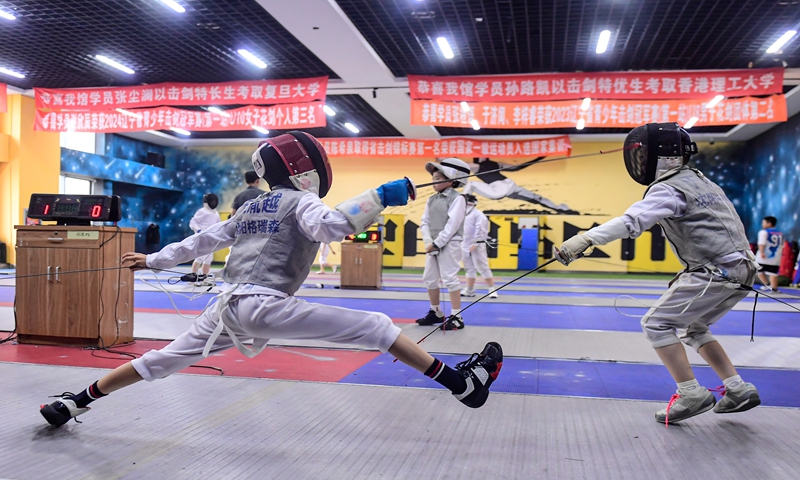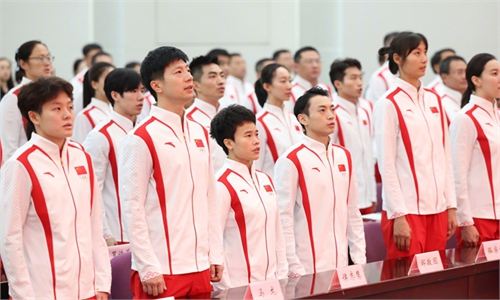China’s Olympic success fuels growth in public interest, family investment in competitive sports

Children practice fencing at a training camp in Shenyang, Northeast China's Liaoning Province, on August 6, 2024. Photo: VCG
The achievements of Chinese players in Paris 2024 Olympic Games have fueled public interest in many sports programs. Gen-Z athletes have left their mark on the global sporting stage, with their unique demeanor and relaxed attitude, showcasing their talent across various arenas.
The outstanding and vibrant performance of Chinese athletes has also motivated the younger generation to take up sports, an expert told the Global Times, adding that it has also encouraged many families to increase their investment in their children's sports activities.
Inspire public interest
After China's Zheng Qinwen won gold in the women's tennis singles, a trend toward the "tennis economy" is taking hold, as sales of tennis training courses more than doubled in July, with first-tier cities seeing a surge in participants.
Since July, there has been a 172 percent year-on-year increase in group purchase orders related to tennis, and a 90 percent increase in orders for badminton. Searches for "rock-climbing gyms" have increased by 62 percent, while searches for "archery gyms" have risen by 40 percent. Additionally, the number of searches for "swimming pools" also increased by 30 percent year-on-year, according to data from Meituan, reported by media.
Additionally, the rise in popularity of niche sports such as BMX freestyle cycling and fencing in China has also led to the development of new exercise habits and consumption trends among a growing community of sports enthusiasts.
He Wenyi, the deputy director of the National Sports Industry Research Base at Peking University, told the Global Times on Tuesday that with the emergence of a new generation of young athletes encouraging more children and teenagers to participate in sports, competitive sports will promote the development of mass sports to a greater extent, which will also have a positive impact on the popularization of sports activities for the public.
According to He, the success of China's Olympic champions is inspiring many families to invest more in their children's sports activities, aiming to cultivate their talents and enhance their overall development.
However, the expansion of the competitive sports industry does not depend solely on individual younger generation but also on the support of families and schools. The promotion of competitive sports selection is essential, as a wider pool of candidates makes the selection process smoother. A positive cycle of talent development is needed, He emphasized.
As a result of the influence of these Olympic champions, a trend has developed in some areas of increased support from the government, the education sector, schools and parents. Many athletes have achieved such success due to the firm support of their parents and the popularization in schools, and the impact of the cycle is long-lasting and profound, He said.
According to a report published by the International Tennis Federation, China ranked second globally in tennis participation after the US with 19.92 million participants in 2021, as reported by media.
Investment from family
Meanwhile, another trend has emerged. Many parents who are financially well off, are choosing to invest in sports for their children, which is a positive step for competitive sports. He added. Parents are making a conscious effort to involve their children in sports activities more frequently. Unlike in the past, parents are now leading their children to participate in sports activities with more scientific training methods.
Following China's Pan Zhanle breaking world record to clinch gold in the 100m freestyle, the Chinese swimming team culminated their Paris Olympics performance with a sensational gold medal in the men's 4x100m medley relay, breaking 40 years of dominance by the US swimmers in this sport.
A mother of a 6-year-old boy shared with the Global Times on Tuesday that she and her son watched those swimming competitions during the Olympics. Inspired by the Chinese swimmer in the Olympics, she hopes that her son can continue swimming. She also noted that children today have more opportunities to engage in sports, compared to when she was a child.
Besides the 20-year-old swimmer Pan, 17-year-old Huang Yuting and 19-year-old Sheng Lihao clinched China's first gold in the 10m air rifle mixed team event in Paris. These young athletes showcased their relaxed attitude, as Sheng, known on China's X-like platform Weibo as "only by eating," quickly attracted the public attention.
Many netizens have praised the young athletes for their distinctive personalities and frankness, commenting that this is how young people should be.
The 11-year-old skateboarder Zheng Haohao, who is the youngest member of the Chinese delegation, also made history by becoming China's youngest Olympian.
Witnessing champions in action can give people the confidence and motivation to take part in sports, which in turn significantly boosts participation in sports activities, He noted. However, participants in competitive sports and those involved in mass sports have different needs and aspirations in sports and physical education programs. The aim of mass sports is to enhance physical fitness rather than solely aiming for medals.
Various demographics have different motivations and objectives when it comes to sport participation. For example, youth may aim to acquire qualifications or certifications in sports, while middle-aged individuals may see sport as a source of leisure and enjoyment.
Conversely, seniors may prioritize sport as a way to maintain their physical well-being. Across all age groups, the promotion of exercise remains encouraged, He added.

